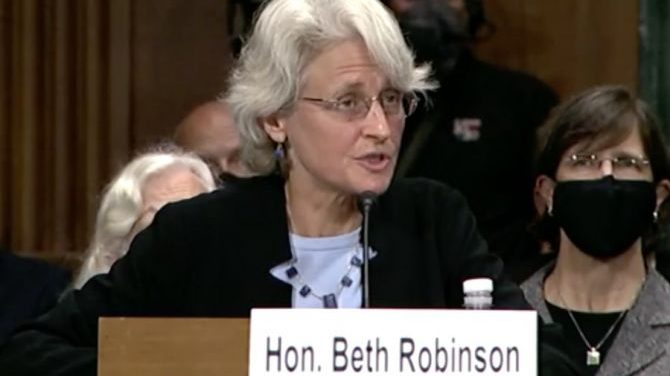Multiple senators accused a judicial nominee of being hostile to religious freedom during her confirmation hearing on Tuesday, Sept. 14.
Beth Robinson, nominated by President Joe Biden to be a judge on the U.S. Second Circuit Court of Appeals, was grilled by Sens. Ted Cruz (R-Texas) and Josh Hawley (R-Mo.) on Wednesday. They asked her about her representing a woman who sued a Vermont Catholic-owned print shop in the 1990s for not printing business cards of a pro-abortion group.
The print shop, Regal Art Press in St. Alban’s, Vermont, was owned by two practicing Catholics, the Bakers. Robinson’s client, Linda Paquette, sought to order membership cards for the now-inactive organization Vermont Catholics for Choice. The Bakers refused the order, saying that they did not believe Catholics could be in favor of abortion, and Paquette sued, saying that her rights were violated.
In a legal brief supporting Paquette in state courts, Robinson referred to the Baker family’s pro-life beliefs as “invidious” and “pernicious.”
Cruz described the brief as containing “strong and even incendiary language” regarding the Bakers’ Catholic faith, and said that she had a “marked hostility” towards religious liberty.
“How might a litigant in the Second Circuit have any confidence that as a judge you would actually follow the law, and in particular, honor the religious liberty protections in the Constitution,” asked Cruz.
Robinson explained to Cruz that the case was 30 years ago, during her first year of law practice in the state of Vermont. Her client, she said, claimed that she had been discriminated against as a Catholic who was in favor of abortion rights.
“In particular, she had asked to print cards for Vermont Catholics for Free Choice,” said Robinson. “Her contention was that the Bakers said ‘we won’t print these cards because we don’t think Catholics can be for choice.’ She brought a claim for discrimination on the basis of creed.”
Robinson acknowledged that Paquette would not have had a case had the Bakers refused to print the cards because of their opposition to abortion, and not because of their religious beliefs.
Cruz pressed Robinson further, asking her if she was effectively arguing that the Vermont Supreme Court should have been able to rule on how the Baker family decided to interpret their faith.
“‘We’re going to force you to say that the Catholic Church is pro-abortion, even if you don’t believe it is.’ Is that right?” asked Cruz, paraphrasing the hypothetical argument.
The case pre-existed the Religious Freedom Restoration Act, federal 1993 law that required the government to pass a legal standard when substantially burdening a person’s religious freedom. Cruz reminded Robinson that the act was passed to fill gaps in the legal precedent she cited.
Missouri senator Hawley raised similar concerns, telling Robinson that he was “troubled by your history of compelling individuals to express pro-abortion viewpoints against their religious convictions,” and that he had “profound concerns” about her nomination.
Hawley noted that in the 30 years since the case was filed, the Supreme Court has stood on the side of religious liberty in similar cases. He asked Robinson if she would acknowledge that “today your client would not have the right to compel other individuals to speak in a way that she favors,” and if she would “stand by” the brief.
Robinson said that she did not remember all of the words in the brief as it had been 30 years.

